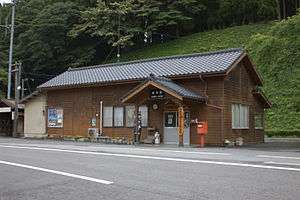Takimizu Station
Takimizu Station (滝水駅, Takimizu-eki) is a railway station on the Hohi Main Line operated by JR Kyushu in Aso, Kumamoto, Japan.[1][2]
Takimizu Station 滝水駅 | |
|---|---|
 Takimizu Station in 2009 | |
| Location | Japan |
| Coordinates | 32°56′00″N 131°14′34″E |
| Operated by | |
| Line(s) | ■ Hōhi Main Line |
| Distance | 69.0 km from Kumamoto |
| Platforms | 1 side platform |
| Tracks | 1 |
| Construction | |
| Structure type | At grade |
| Other information | |
| Status | Unstaffed |
| Website | Official website |
| History | |
| Opened | 2 December 1928 |
| Location | |
 Takimizu Station Location within Japan | |
Lines
The station is served by the Hōhi Main Line and is located 69.0 km from the starting point of the line at Kumamoto.[3]
Layout
The station consists of a side platform serving a single tracks at grade. The station building is wooden structure of traditional Japanese design with a tiled roof. It is, however, unstaffed, and the main part of the building is now used by the local chamber of commerce and thus not accessible to passengers. Instead, the platform is accessed through a passage beside the building. On the platform facing the track, an annex of the station building has been opened up as a waiting room.[2][3][4]
 A view of the platform and track.
A view of the platform and track.
History
Japanese Government Railways (JGR) had opened the Inukai Light Rail Line (犬飼軽便線) (later Inukai Line) from Ōita to Nakahanda on 1 April 1914. The track was extended westwards in phases, with Tamarai being established as its western terminus on 30 November 1925. Further to the west, JGR had, on 21 June 1914 opened the Miyaji Light Rail Line (宮地軽便線) (later the Miyaji Line) from Kumamoto east to Higo-Ōzu. This track was also extended in phases, reaching Miyaji as its eastern terminus on 25 January 1918. On 2 December 1928, Miyaji and Tamarai were linked up, with Takimizu opening on the same day as one of several intermediate stations along the new track. Through-traffic was established between Kumamoto and Ōita. The Inukai and Miyaji lines were merged and the entire stretch redesignated as the Hōhi Main Line. With the privatization of Japanese National Railways (JNR), the successor of JGR, on 1 April 1987, Takimizu came under the control of JR Kyushu.[5][6]
On 17 September 2017, Typhoon Talim (Typhoon 18) damaged the Hōhi Main Line at several locations. Services between Aso and Nakahanda, including Takimizu, were suspended and replaced by bus services. Rail service from Aso through this station to Miemachi was restored by 22 September 2017[7] Normal rail services between Aso and Ōita were restored by 2 October 2017.[8]
Environs
- Aso City Hall Namino Branch
- Namino Post office
See also
References
- "JR Kyushu Route Map" (PDF). JR Kyushu. Retrieved 23 February 2018.
- "滝水" [Takimizu]. hacchi-no-he.net. Retrieved 22 April 2018.
- Kawashima, Ryōzō (2013). 図説: 日本の鉄道 四国・九州ライン 全線・全駅・全配線・第6巻 熊本 大分 エリア [Japan Railways Illustrated. Shikoku and Kyushu. All lines, all stations, all track layouts. Volume 6 Kumamoto Ōita Area] (in Japanese). Kodansha. pp. 39, 78. ISBN 9784062951654.
- "滝水" [Takimizu]. Retrieved 22 April 2018. Blog entry with good photographic coverage of station facilities.
- Ishino, Tetsu; et al., eds. (1998). 停車場変遷大事典 国鉄・JR編 [Station Transition Directory - JNR/JR] (in Japanese). I. Tokyo: JTB Corporation. p. 228. ISBN 4533029809.
- Ishino, Tetsu; et al., eds. (1998). 停車場変遷大事典 国鉄・JR編 [Station Transition Directory - JNR/JR] (in Japanese). II. Tokyo: JTB Corporation. p. 745. ISBN 4533029809.
- "豊肥本線の運休区間が縮小…阿蘇~三重町間再開" [Zone of suspended services on Hōhi Main Line reduced. Aso to Miemachi reopens]. Response.jp. 22 September 2017. Archived from the original on 2 October 2017. Retrieved 15 April 2018.
- "10 月2日(月)からの日豊本線・豊肥本線の運転計画について(お知らせ)" [Operations plan for Nippo Main Line and Hōhi Main Line (notice)] (PDF). JR Kyushu. 29 September 2017. Archived from the original (PDF) on 30 September 2017. Retrieved 1 October 2017.
| Wikimedia Commons has media related to Takimizu Station. |